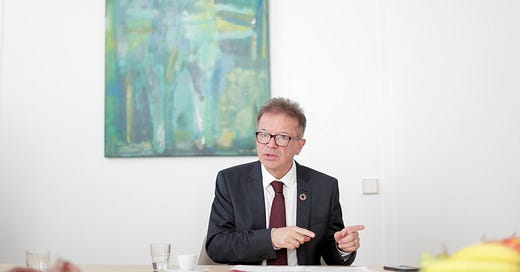Overworked and Exhausted
Citing health concerns, Austria's health minister Rudolf Anschober resigned Tuesday after 15 months in office defined by the coronavirus pandemic
Servus!
Shortly after 9.30 in the morning on Tuesday, health minister Rudolf Anschober stepped before the cameras at a press conference to deliver what was billed as a ‘personal statement.’ Its purpose was to formally announce his resignation after only 15 months in office. At a time of crisis, the post needs someone who is fighting fit and raring to go, Anschober said. That someone is no longer him. Three hours later, vice-chancellor Werner Kogler revealed that Wolfgang Mückstein—a primary care physician in Vienna politically active in Green Party circles—will succeed Anschober. Mückstein will be sworn in by president Alexander Van der Bellen on Monday.
Anschober’s resignation comes as no surprise. Twice in recent weeks, Anschober has had to take extended periods of sick leave due to what was described in the press as Kreislaufschwäche, circulatory problems. In his personal statement, Anschober clarified that he had experienced a Kreislaufkollaps, a circulatory collapse, as well as rising blood pressure and tinnitus in the ears. He differentiated this from burnout, which is to say a mental collapse or fatigue, though what Anschober was describing was in fact the physical manifestations of stress. “I am overworked and exhausted,” he said.
When Anschober became health minister in January 2020, having had an active role in state government in Upper Austria for almost two decades, he could not have foreseen that, one month into the role, Austria would be hit for six by a virus about which little was known and for which there was no antidote. The government’s agenda, negotiated in the winter of 2019/20, outlines its plans for healthcare including greater digitization and improving outcoms for women and the elderly. But the best laid schemes of mice and men often go awry, and Anschober’s time in office was consumed by the coronavirus pandemic, the response to which required a Herculean effort that would have floored the best of us.
Along with chancellor Sebastian Kurz, vice-chancellor Kogler, and interior minister Karl Nehammer, Anschober became one of the public faces of that response, his sword and shield a pen and some charts. Following Austria’s exemplary handling of the first wave between March and May 2020, Anschober’s popularity soared, overtaking that of the beloved chancellor by the summer, a period of relative normality for most Austrians. Knocking Kurz off his perch placed Anschober in a dangerous position, encouraging negative briefings against him which, to be sure, were not coming from the green half of the government.
Anschober also made mistakes. That summer was a wasted opportunity during which his health ministry failed to build up the country’s testing capacity. Kurz and Anschober waited too long during the autumn to institute a second lockdown, a hesitancy for which Austria continues to pay a price. His ministry failed to seize opportunities to buy extra vaccine doses within the scope of the EU’s procurement program. This was not all his fault, of course. Austria’s botched handling of the second and third waves of the coronavirus is a crime with many suspects, and Anschober was the victim of competing interests in the chancellery, finance ministry, and among state governors. Their concerns, putting it mildly, were not his own.
For his successor Mückstein, the task at hand is three-fold. First, the coronavirus’s mutations, especially the British B.1.1.7 variant currently rampaging its way through the Viennese populace. Second, Austria’s corona deniers and those eschewing the country’s testing and vaccination programs. And third, long COVID, the sufferers of which will require long-term care of one kind or another for years to come.
Bis bald!
Thank you for subscribing to the Vienna Briefing. Do you know someone who would be interested in receiving this newsletter? Consider sharing it with them today.
Schmid Out
Thomas Schmid will not stay on as head of Austria Holding PLC once his contract expires in March 2022. The ex-director of the finance ministry had come under fire following the publication of text messages between him, Kurz, and finance minister Gernot Blümel that appear to show Schmid in effect writing his own job description and selecting the members of Austria Holding’s board.
J&J Comes—And Goes
Austria received its first shipment of 16,800 doses of the Johnson & Johnson coronavirus vaccine Tuesday. The American firm has since “proactively delay[ed]” the vaccine’s rollout in Europe due to “an extremely rare disorder involving people with blood clots in combination with low platelets in a small number of individuals” who received the vaccine. As of Tuesday, 20 percent of Austrians over the age of 16 had received their first dose of a coronavirus vaccine.
Longest Easter Continues
The Easter lockdown affecting the states of Vienna and Lower Austria has been extended to May 2, the states’ governors confirmed Monday. Intensive care beds reserved for coronavirus patients were at 67.3 percent capacity in the Austrian capital as of Tuesday.




